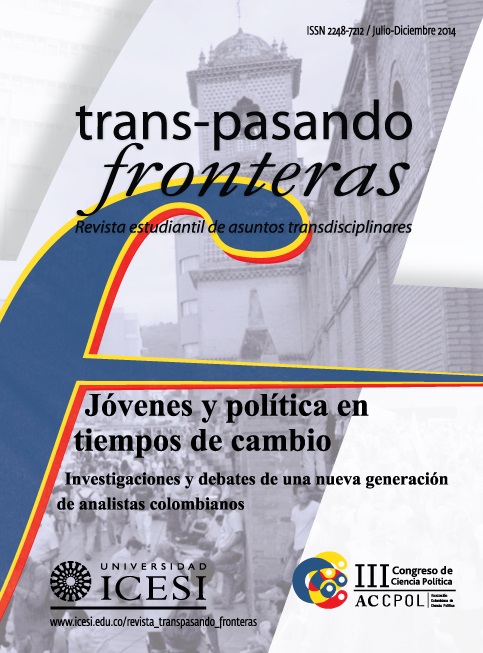Towards the history of student movement in colombia: fundamental theoretical and methodological elements
DOI:
https://doi.org/10.18046/retf.i6.1869Keywords:
Student Movement, Political history of Colombia, Descriptive historiography, Social movements, Political Science,Abstract
This paper answers to the question about how to approach the study of the history of the Student Movement (SM) in Colombia from the disciplines Political Science, Politics and Sociology Politics historiography. Initially it starts by justify the relevance of the very purpose of historicizing said object (Colombian SM), ie, the need for the question. In response to it it alluded to the need to undertake efforts descriptive as a first step to understanding our object of study, in the broader framework of Colombian political history as further interpretive context. In a second currently, is argued about the relevance to address the Student Movement study object by theories of collective action and, particularly, of social movements. Once established this need, will be discuss with Charles Tilly some ideas in order to produce a clear operating concept and social movements -differencing it from mobilization of masses- that will be use by the colombian researchers of social movements and particularly the SM develop. Finally, will be exposed the basic descriptive categories that composes the concept of social movement produced. These categories will be unlinked to its American origin and, as an suggestive example, will be developed and operationalized one of them (organizational structure). To conclude, a brief summary of the assay is exposed and in order to contribute to the promotion of academic initiatives on social movements as part of a Colombian political history from the analytical point of view of subordinates, inescapable purpose of declaring every Colombian social scientist committed to our historical and political realities.
Downloads
References
ALTHUSSER, Louis. (1965). Hacia un concepto de historia. La pensé. (121).
ARCHILA, Mauricio (2003). Idas y venidas, vueltas y revueltas. Protestas sociales en Colombia 1958- 1990. Bogotá, Colombia: CINEP.
ARCHILA, Mauricio (2012). El Movimiento Estudiantil en Colombia, una mirada histórica. Osal. Observatorio social de América Latina. (31) 71-104.
ARRUBLA, Mauricio (1978). Colombia Hoy. Bogotá, Colombia: Siglo veintiuno editores.
BOBBIO, Norberto; MATTEUCCI, Nicola y PASQUINO, Gianfranco. Diccionario de política. México DF, México: Siglo XXI.
BOYD, C. O. (1993). Phenomenology: The Method. En P. L. Munhall and C. O. Boyd (eds.). Nursing Research: A Qualitative Perspective. (pp. 99-132). New York, Estados Unidos de América: National League for Nursing.
GONZÁLEZ, Adriana. (2010). Acción colectiva , tropel y rutinas instaladas. En Universidad y coyuntura: una oportunidad para decir. (pp. 27-32). Medellín, Colombia: Instituto de Estudios Políticos, Universidad de Antioquia.
HOLSTEIN, J. A. y GUBRIUM, J. F. (1994). Phenomenology, Ethnomethodology, and Interpretative Practice. En N. K. Denzin and Y. S. Lincoln. Handbook of Qualitative Research. (pp. 262-272). California, Estados Unidos de América: Thousand Oaks.
MCADAM, D. MCCARTHY, J. D., y ZALD, M. N. (1999). Movimientos sociales: perspectivas comparadas. Madrid, España: Ediciones Istmo.
MUÑOZ, Natalia y Andrea Hernández (2013). “La MANE como mecanismo legítimo de representación estudiantil”. En: Trans-pasando Fronteras, núm. 3, pp. 59-69. Cali: Universidad Icesi.
NAVIA, Lisandro (1997). El estudiantado: nueva categoría social. Revista Universidad de Medellín. (65).
NAVIA, Lisandro (1999). En la escuela: ¿está el prolegómeno al régimen político solidario?. Kabái, (4).
OLSON, Mancur. (1992). La lógica de la acción colectiva: Bienes públicos y teoría de grupos. Limusa S.A.
RIECHMANN, J. y FERNÁNDEZ, F. (1994). Redes que dan libertad: introducción a los nuevos movimientos sociales. Madrid, España: Paidós.
TARROW, Sidney (1997). El poder en movimiento. Los movimientos sociales, la acción colectiva y la política. Madrid, España: Alianza Editorial.
TILLY, Charles (2012). Los movimientos sociales 1768 - 2008. Desde sus orígenes a Facebook. Barcelona, España: Editorial Crítica, S. L.
TILLY, Charles (1995). Los movimientos sociales como agrupaciones históricamente específicas de actuaciones políticas. Sociológica. (28).
VAN MANNEN, M. (1990). Researching Lived Experience: Human Science for on Action Sensitive Pedagogy. Ontario, Londres: Althouse.
YIN, R. K. (1993). Applications of Case Study Research. Washington, D. C., Estados Unidos de América: Cosmos.
Linkografía
Antígona (2011). “Sobre el Movimiento Estudiantil actual y su historia”. En: Colectivo Antígona. Consultado el 10 de septiembre de 2014, desde http://goo.gl/nclkmW
Downloads
Published
Issue
Section
License
Trans-pasando Fronteras provides immediate open access to its content on the principle that making research freely available to the public supports a greater global exchange of knowledge.
© Authors hold copyright and publishing rights without restrictions but in accordance with the CC license.
All the material in this publication can be reproduced as long as reference is made to title, author and institutional source.







